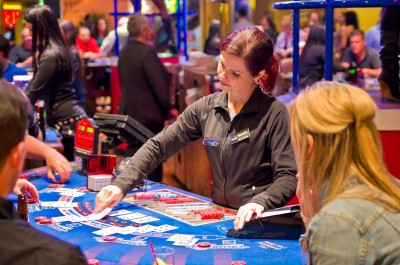
With plans for casino construction underway in Massachusetts, the University of Massachusetts Amherst, in cooperation with the Massachusetts Gaming Commission, will begin its second large research study about gambling problems in early 2015.
The project aims to identify the social and economic impacts of casinos and gambling in Massachusetts as the casinos are constructed, said Rachel Volberg, associate professor in the School of Public Health at UMass and the principal investigator of the two projects.
The first study, known as the Social and Economic Impacts of Gambling in Massachusetts study, was launched in 2013 and evaluates public attitudes about a variety of issues associated with gambling.
Volberg said the difference between the upcoming gambling study and issue studies conducted in the past is the ability to begin studying the communities before casinos break ground.
“The idea is that the social and economic impacts on casino gambling have very rarely been examined over time, and even more rarely have researchers and policy makers have information about what the social and economic landscape looked like before the casinos were introduced,” Volberg said. “Typically, impact studies that have been done don’t start with a clean baseline. They take a look back and find ways to basically adjust.”
The second study, titled the Massachusetts Impact Gambling Cohort study, differs from the first study in that it will interview its subjects each year for five years.
“What that’s designed to do is sort of drill down much more to look at how individuals’ behavior changes over time as everybody in that cohort is exposed to casino gambling in Massachusetts,” Volberg said.
The Expanded Gaming Act, passed in 2011, requires the MGC to conduct studies that evaluate the effects of casinos on the Commonwealth, said Stephen Crosby, MGC chair.
“One of the features of the Expanded Gaming Law was a mandate for us to conduct the comprehensive gaming long-term longitudinal research study on the social and economic impacts of gaming, as well as the ideology of problem gaming, which means the process by which people get into problem gambling, and how they get out of it, and what are the common characteristics, and what interventions help, and so forth,” Crosby said.
The collected information is analyzed through a research agenda and annual report, which is used by Massachusetts legislature and the MGC to develop regulations and potentially, new policy, Volberg said.
Fred Bayles, associate professor in Boston University’s College of Communication and director of the State House Program, indicated that the effectiveness of the research will only be seen in the long run, after the casinos’ construction.
“The research that they’re doing now is baseline research, so I don’t think this phase will have much influence directly,” he said. “In terms of the future, the research will have a certain influence, but I think the real wildcard will be anecdotal stories that come out of the casino deal.”
Bayles said another aspect of the research’s success will be determined by future revenues of the casinos.
“If it’s not making much money for the state and it’s causing a lot of problems, you might see some more draconian legislation [coming from the deal],” he said. “If it’s making a lot of money for the state and the problems aren’t very significant, we can pay for the problems through the revenues they’re making for the research itself.”
Several residents said the research will accurately reflect the impact that casinos and gambling will have on Massachusetts.
Katherine Mason, 24, of Allston, said the casinos will affect Massachusetts residents negatively, which will be seen in the research.
“Gambling brings out a hype in people, and we already have a hype in Boston, and I guess it’s hard to manage that when you have so much going on, and that would definitely be seen in the research,” she said.
Zhaodan Kong, 32, of Allston, said the effectiveness of legislation passed will rely on the thoroughness of the research.
“If the research is conducted systematically, you will have a very good idea of if the laws will be effective,” he said. “Also, if the law is going to depend on the outcome of the research, it will be very good because the research is indicative.”



The MA Gaming Commission is being very proactive in their approach to reduce any negative impacts MA casinos might have on State residents. There are over 8,000 lottery sellers in the state compared to 3 currently licensed properties that will offer casino games. I would like to know if there is any comparable type program, currently in place, that is concerned with the per capita lottery spend of low income residents. Convenience is one factor in compulsive behavior, and I doubt that there are any MA communities, that do not have several places where lottery tickets or Keno games are not available.